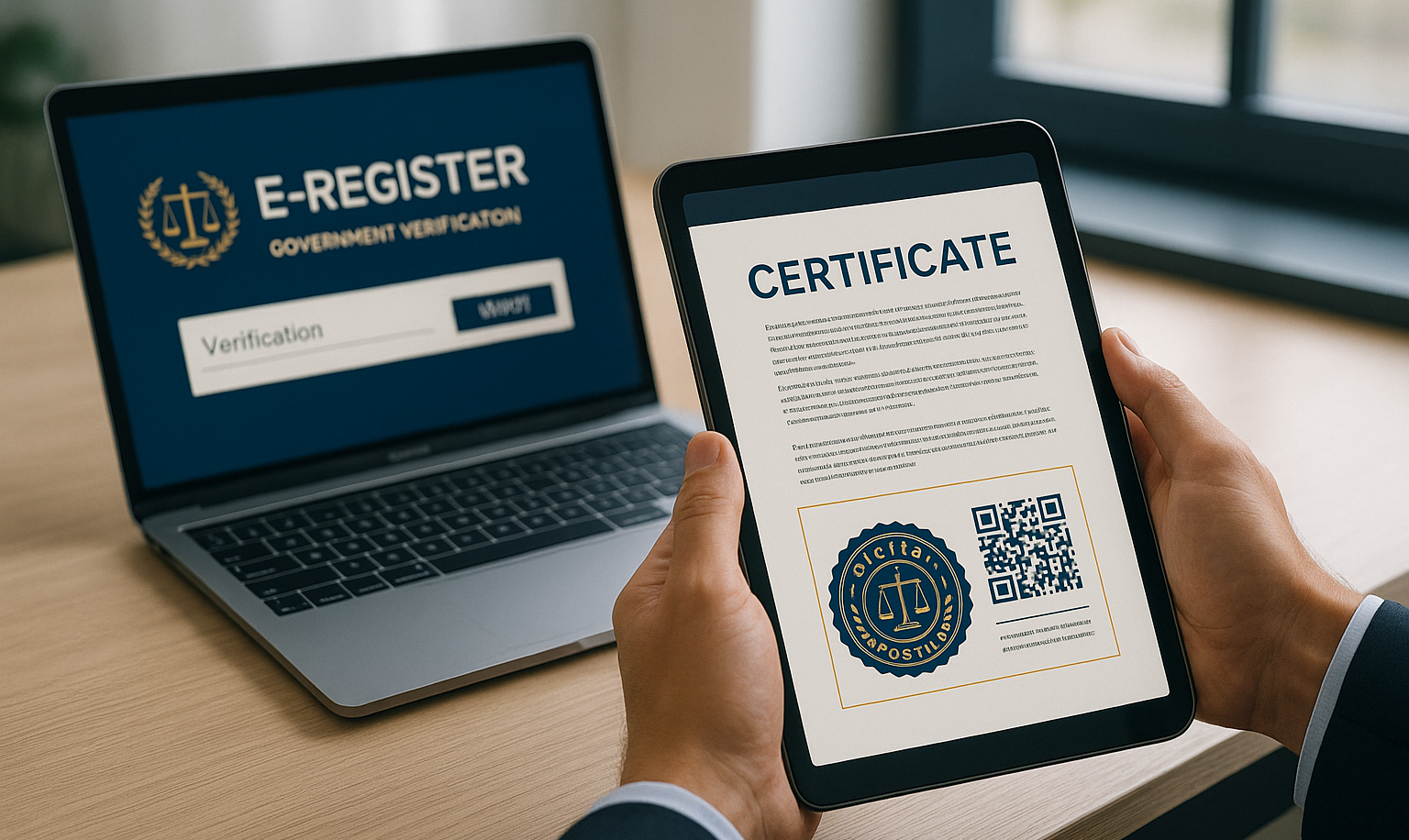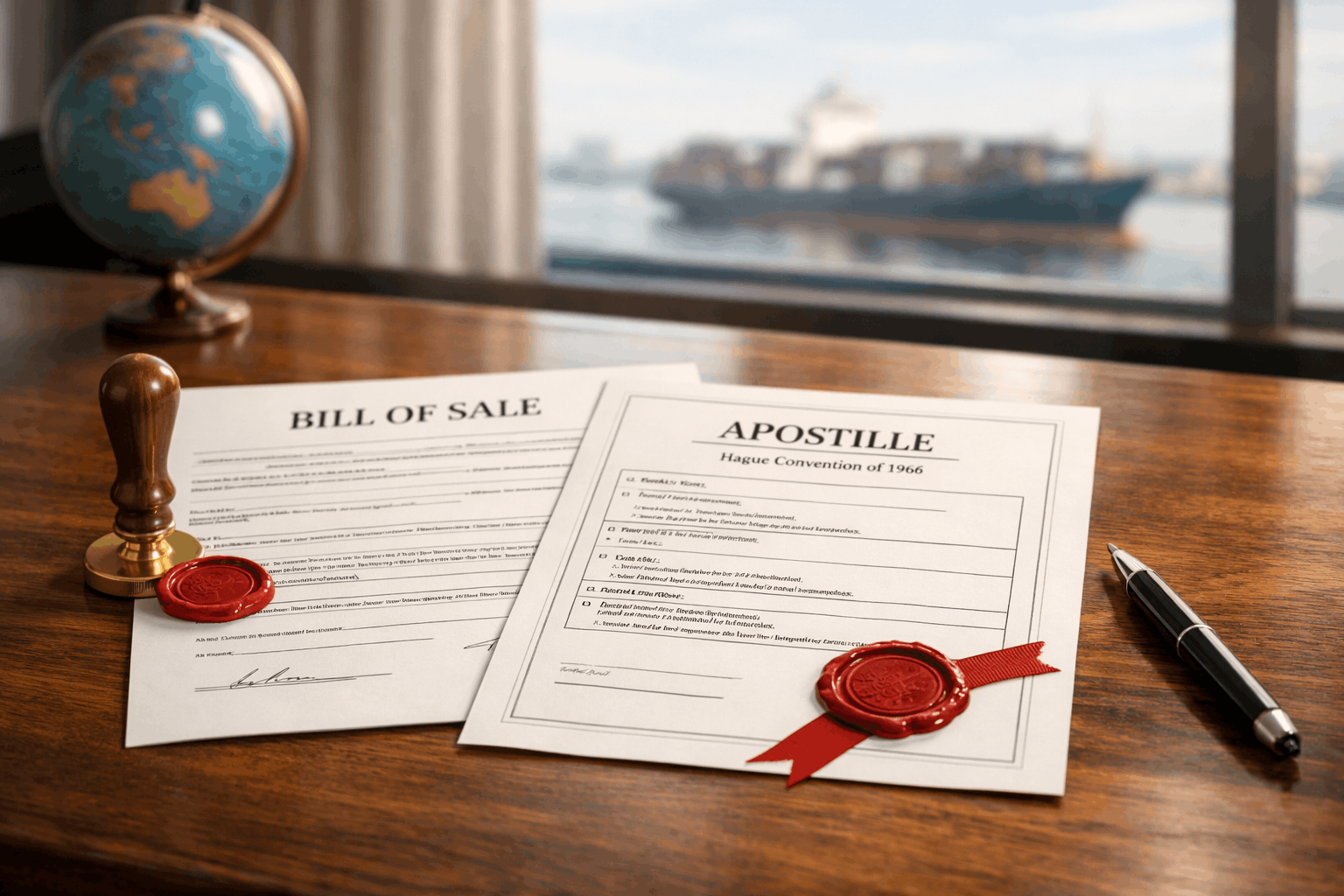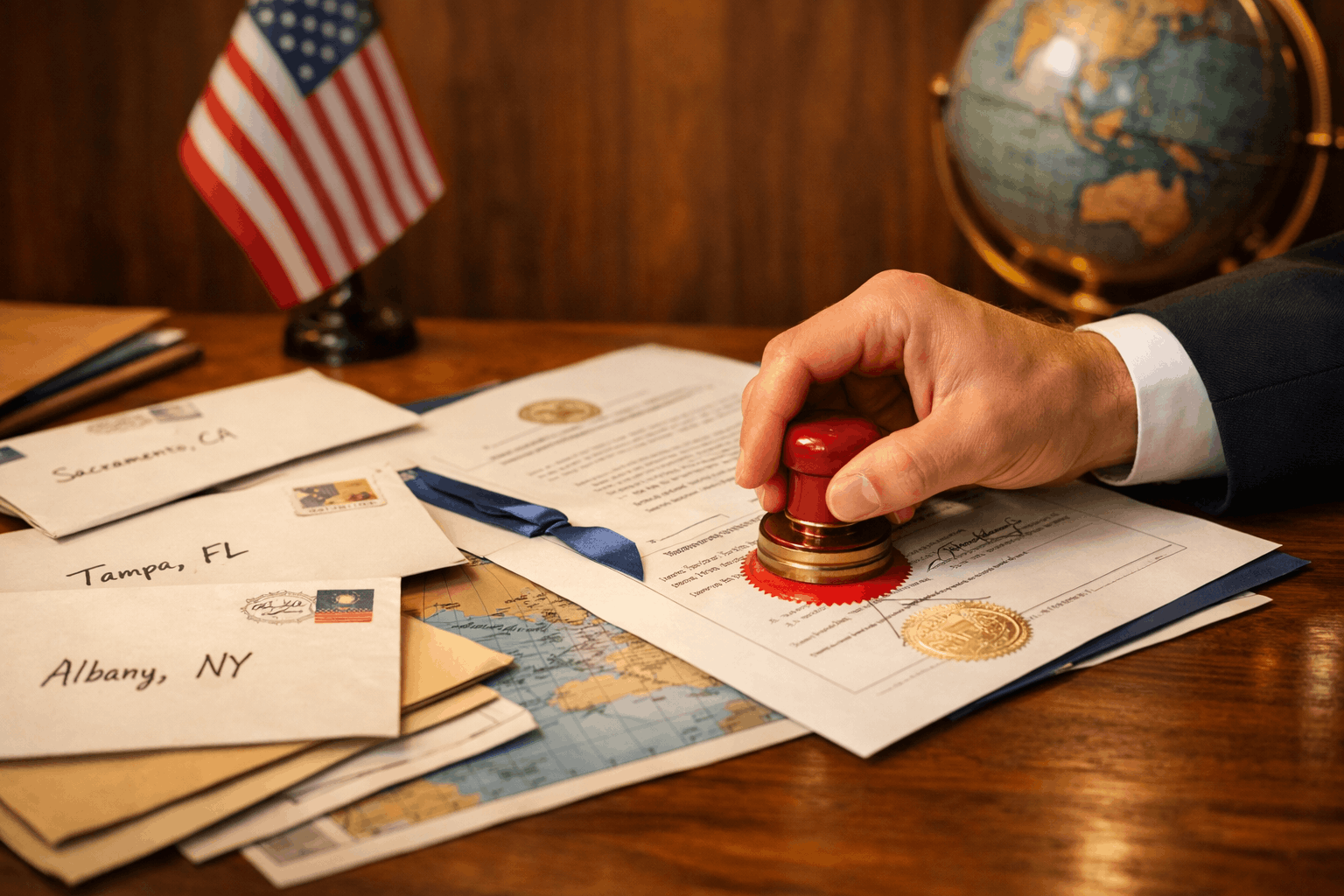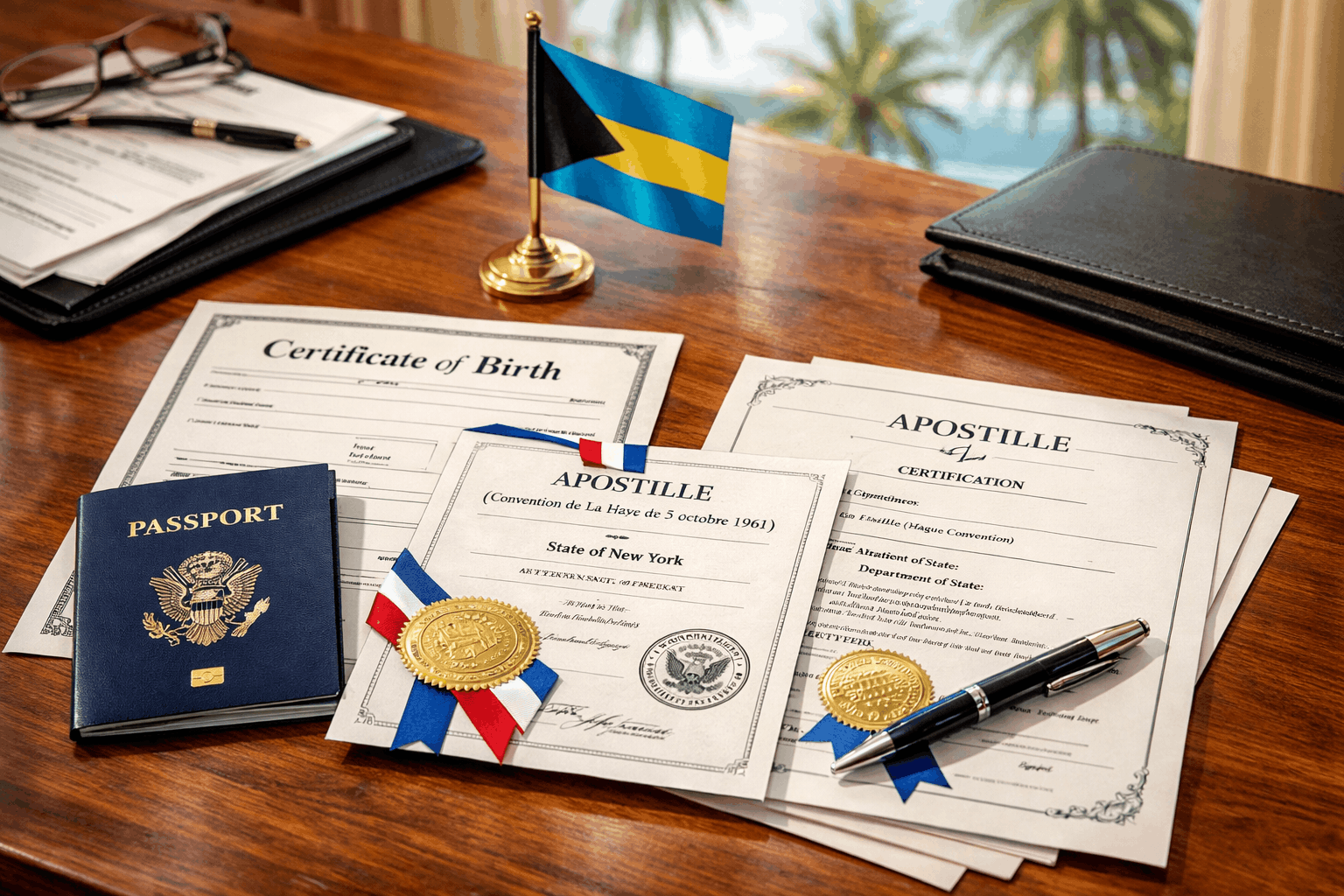
What Is e-Apostille in the USA? States That Provide Digital Apostille Services
The traditional paper-based apostille with secretarial seals has been the norm since 1961. However, the rise of e-Apostille USA services is quietly revolutionizing how Americans authenticate documents for global use. The shift isn’t just an upgrade: it’s an embedded fundamental change, bringing speed, security, and convenience. Today, we’ll explore what digital apostille USA solutions offer and which states are leading the charge in the digitization of document authentication.
Understanding the Concept of e-Apostille
An e-Apostille is a digital certification permanently attached to an electronic document, like a PDF. It features a unique digital signature by a competent authority, entirely replacing the physical stamp. The verification process also happens online — from submitting a request to receiving your apostilled documents.
This is made possible by the electronic Apostille Program (e-APP) in the USA. Participating in this initiative, government officials can issue and verify digital apostilles instantly using an online registry, eliminating physical handling and manual checks. The program facilitates faster processing times, minimizes administrative hassles, and increases tamper resistance.
As more authorities adopt this framework, you can validate your paperwork more efficiently for legal matters, business transactions, or employment overseas. Anyone can verify USA apostilles online by using their QR code or unique reference number through the official e-Registers. This means your e-Apostille for a diploma will be validated and accepted more quickly by the foreign institution.
Benefits of Digital Apostille Over Traditional Apostille
So, why does this shift towards online apostilles in the USA matter? E-Apostilles outperform the traditional method by unlocking powerful advantages beyond being a smarter solution in the digital age. We’ll go over the benefits that digital apostilles deliver — how they redefine credibility and efficiency in authenticating public documents for foreign acceptance.
Enhanced Security and Fraud Prevention
One of the best features that an e-Apostille has to offer is the cryptographic signature, making it impossible to forge. Suppose you authenticate your birth certificate through a digital apostille service for a visa application at the Spanish embassy. Immigration officials will simply scan the secure QR code that instantly confirms its legitimacy on the issuing authority’s database, removing the risk of a counterfeit or altered apostille.
Unlike the paper apostille, which can be vulnerable to tampering, this electronic seal deters fraud by a built-in defense mechanism. If the information provided in the underlying document was intercepted, the digital signature of the e-Apostille would break immediately. This creates trust across borders, allowing for safer and more transparent international transactions.
Faster Cross-Border Validation
The physical apostille relies heavily on mailing services, which increases the time it takes between the point when you receive an apostille and when the foreign authority reviews it. For instance, a recipient abroad often waits days for physical delivery and manual verification. Digital apostilles eliminate this bottleneck and enable you to email or upload the authenticated paperwork instantly.
This rapid turnaround significantly impacts time-sensitive cases. For a student who needs to submit their academic qualifications by a strict deadline, an e-Apostille allows the receiving university quick access and authentication through an online platform. The student no longer has to worry about whether their apostille is lost during transit or wouldn’t make it before the due date for admission consideration.
Convenience for Remote Applications
The digital apostille process is tailored for those wishing to manage authentication from afar. Imagine you’re an expat living in Singapore and want to obtain an apostille for a marriage license back home in California. E-Apostille services are created for scenarios like this, making it possible to receive authentication and mitigating the need for international postage or in-person government office visits.
Through the e-APP in the USA, individuals and businesses in further areas now have equal access to document apostille services to those living next door to the Secretary of State’s office. This level of convenience bridges the gap of geographical barriers, empowering applicants to handle documentation from anywhere without ever having to confront logistical headaches.
Global and U.S. Adoption of e-Apostille
The push of e-Apostille for digital authentication stems from the Hague Conference on Private International Law. In particular, they launched the e-APP that we have mentioned earlier in an effort to modernize authentication among member countries. This initiative creates a standardized framework for issuing and verifying digital apostilles, ensuring that those issued by participating countries will be recognized in any other member without a hitch.
In the USA, online apostille adoption is determined by the state; each manages its own process. That means implementation depends on the individual Secretary of State’s decisions. Currently, there are a handful of states offering e-Apostilles, offering their residents streamlined digital access and reducing the cost of delays or rejections. That said, the paper-based method retains its popularity among most states for its nationwide application. For federal paperwork, the U.S. Department of State also only issues physical apostilles.
States That Provide Digital Apostille Services
As the document authentication landscape is rapidly evolving with the e-Apostille movement in the USA, various states have begun to implement this certification format. You may ask if your home state embraces digital authentication or not. No worries, as this section will give you the answer you’re seeking. We’ll break down which states are pioneers and have adopted e-Apostilles or e-Registers.
Early Adopters of e-Apostille
Montana is the first state in the U.S. to offer digital apostille services starting in August 2020, setting the tone for others to follow suit. Utah, Rhode Island, Connecticut, and Maryland soon integrated electronic systems for apostille issuance and verification. These early birds demonstrate the efficiency and practicality of the e-APP initiative in the USA, encouraging the spread of digital transformation in document certification throughout the rest of the country.
Washington’s Digital Apostille Launch
In early 2024, Washington announced its participation in the ranks of states that provide e-Apostilles. As part of the pilot program, the state also introduced an e-Register system where its citizens can confirm the apostille’s authenticity electronically. This major milestone has allowed many people and businesses to cut wait times and reduce expenses on document authentication.
Now, international students who need to authenticate their diplomas don’t have to wait 4 to 6 weeks for a paper apostille. The new digital apostille certification is available in days. On top of that, they can reuse the e-Apostille many times for at least the next five years, unlike the paper-based one.
Other States Now Offering Digital Apostille
Minnesota and Kentucky also recently joined the list of states that offer digital apostilles, expanding the map for those seeking modern authentication. Residents of these states can now request apostilles online via secure portals and receive them in their inboxes. Typically, the e-Apostille and the underlying document will be combined into a single PDF file. It can eventually be forwarded easily to the requesting party overseas within minutes, making it more convenient for checking.
States with e-Registers but Paper Apostilles
Several other states have taken partial steps towards digitization by operating e-Registers — public databases for verifying the status of paper apostilles. These include California, Texas, New York, North Carolina, Arkansas, Delaware, Tennessee, and West Virginia. Despite having an electronic verification portal, they still issue only physical apostilles. This means you’ll enjoy a hybrid approach where the foreign authority can verify your paper apostille quickly through the state’s e-Register, improving security against fraudulent activities.
Challenges and Future Outlook
Despite the benefits of digital apostilles, barriers to wider adoption remain significant. The most visible hurdle is the decentralized implementation by states, creating a fragmented system. Concerns also arise from the cost of digital infrastructure and legal frameworks that still privilege ink signatures. Such obstacles slow down the progress of a fully digital rollout in the country.
However, looking ahead, the expected expansion in the next decade is still optimistic. Driven by the modernization trend of document authentication worldwide, more U.S. states are expected to join the e-APP. We’ll likely observe successful early models and public demand compelling many states to go digital for faster, secure, and remote-friendly apostilles. With time, e-Apostille would become the new standard for the majority of states, replacing the traditional system while keeping pace with international regulations.
The Next Chapter for U.S. Document Authentication
The emergence of electronic apostilles marks a turning point in how we handle paperwork. Moving away from the paper-based approach, many states have implemented digital apostille services to meet the global demand for fast, secure, and accessible apostilles for everyone, regardless of their locations. If your state has already issued e-Apostilles, congratulations — you’re spearheading a new era of digital authentication.
FAQ
More questions? We’ll review some frequently asked questions that many applicants have about e-Apostille in the USA here.
Is an e-Apostille legally valid in all Hague Convention countries?
Yes, all participating countries in the e-APP recognize e-Apostilles, given that they are verifiable through the issuing authority’s e-Register. Acceptance among other Hague Convention countries varies, so you’ll need to check with the receiving institution first.
Can I request a digital apostille for federal documents like FBI checks?
No. Federal documents like the FBI background checks are authenticated by the DOS, which currently issues paper apostilles only. E-Apostilles are available at the state level through participating states for their own documents.
How do I verify an e-Apostille online?
You can easily verify an e-Apostille on the issuing authority’s official e-Register. Most e-Registers allow you to verify both physical and electronic apostilles. Look for the unique reference number on the certification and enter it in the search box of the state’s database. The search engine will return information about your e-Apostille status.
Otherwise, if you find a QR code on your e-Apostille, scan it directly using your phone camera. It will then direct you to an e-Register or an official verification website where you can confirm the authenticity of your electronic certification.
Which U.S. states are expected to adopt digital apostilles next?
While there’s no official list of the upcoming states to join the e-APP, those with active e-Registers are the most likely to go fully digital. That said, we have mentioned names like Texas, California, New York, among others. They are potential candidates for future adoption of digital apostilles, as their public demand and existing infrastructure position them favorably for a complete transition to digital authentication.





